The Speed Project Atacama: The rebel race across a desert
- Published

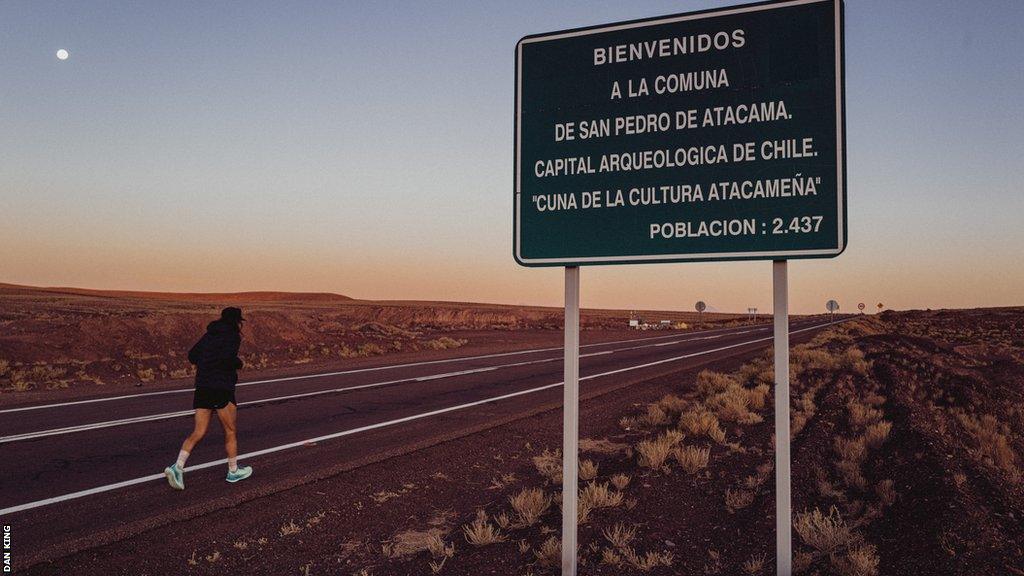
The dry, desolate landscape of the Atacama Desert has been used by American space agency Nasa to replicate conditions on Mars
Sign up for notifications to the latest Insight features via the BBC Sport app and find the most recent in the series.
The Atacama Desert, Chile.
The driest non-polar desert on earth.
Average annual rainfall? Under a millimetre, with some regions waiting decades between sparse showers.
The temperature swings from 30C in the day to below freezing at night.
It is a region so barren and devoid of life that Nasa regularly uses it to simulate and practise for their landings on Mars.
It sounds like a tricky enough place to organise a Parkrun, so where do you even begin organising a 310-mile non-stop ultra-marathon?
If your name is Nils Arend - and your race is The Speed Project - the answer is simple.
You don't.

It's 4am in late November in the Chilean beach city of Iquique.
Ninety runners from all over the world are limbering up in a deserted skatepark on the beachfront, 50m from the Pacific Ocean.
The streets, other than a host of stray dogs, are deserted. Apart from the buzz of camera drones flying overhead and the nervous energy of the short-shorted runners milling about, it is strangely quiet.
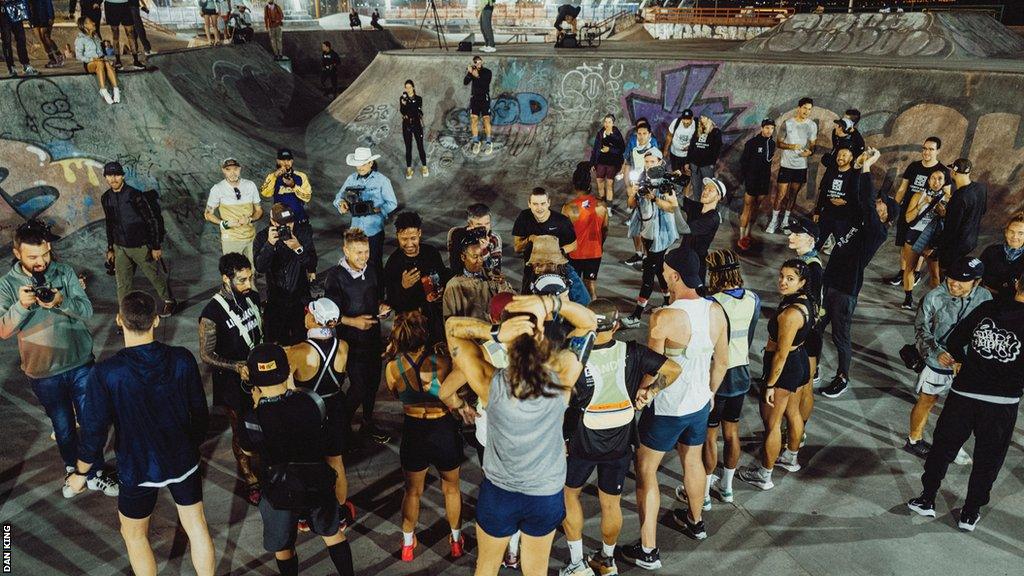
The race's exact start, arbitrarily chosen by organiser Nils Arend, was next to a skatepark in Iquique
Until a voice rises above the rest.
It's the softly spoken German-American fusion accent of the man who has convinced everyone to be here.
And, more importantly, to leave here, on foot, and run across the Atacama Desert, alongside the main highway, to the 'finish line' at San Pedro de Atacama, some 500km away and at an altitude of 2,400m.
Like the American version of The Speed Project (TSP) from Los Angeles to Las Vegas which made organiser Arend's name, this race has no prize money, no rules, no set route and no website.
And, like LA-LV, there is no official way to enter.
Invitations and intros come via Arend's WhatsApp, and the event itself is unsanctioned and entirely unsupported.
Unsupported, perhaps, but certainly not under the radar.
Among the 90 runners - broken down into 15 teams of six - are former Olympians, American MTV presenter Nev Schulman, the so-called "real-life Forrest Gump" William Goodge, one of the fastest Britons to run across America,, external and former women's international footballer Daniela Andrade, who has run the length of Chile solo.
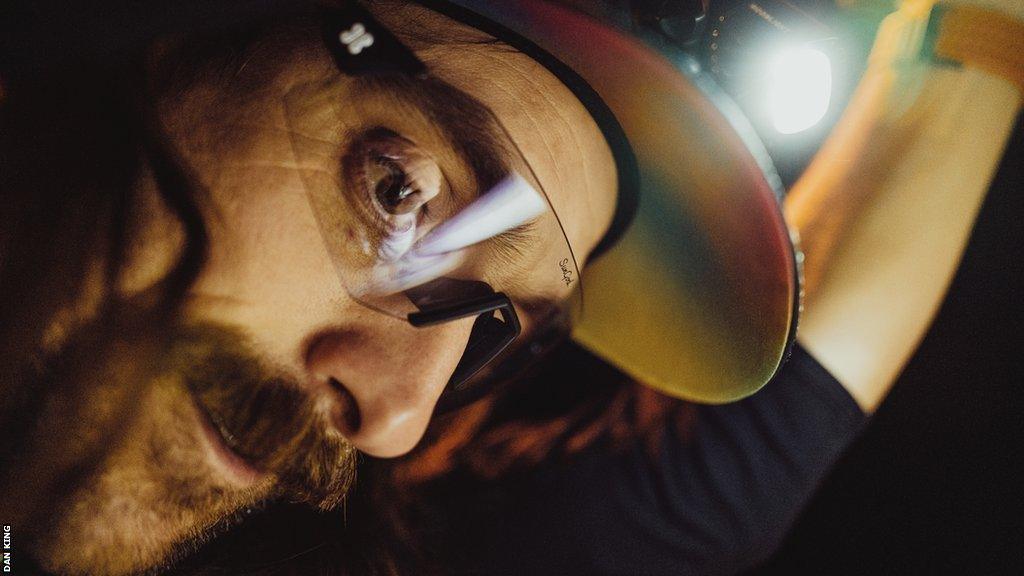
The 90 runners were drawn from all over the world by private invites to take part
When those runners left the 'start line' - an entirely arbitrary point on one edge of the skate park where Arend elected to stand when he got out of his pick-up truck a few minutes earlier - they had zero support from TSP organisers.
Unsupported racing is not a new phenomenon in running, or indeed in other sports like ultra-distance cycling.
For example, The Trans Continental (TCR) is infamous in the world of cycling as a brutal, yet beautiful 4,000km solo race across Europe in which accepting help of any kind means disqualification.
But even in races like TCR each rider has a tracking device and there are checkpoints to ride through and monitor the welfare of the field.
Arend already adamantly shied away from any such checks and balances for The Speed Project.
With TSP Atacama, he pushed the boundaries and runners' comfort zones even further.
In the pre-race briefing he readily admitted that if his US and Chilean races were compared to cats then "LA-LV would be a domestic cat, while Atacama would definitely be a tiger".
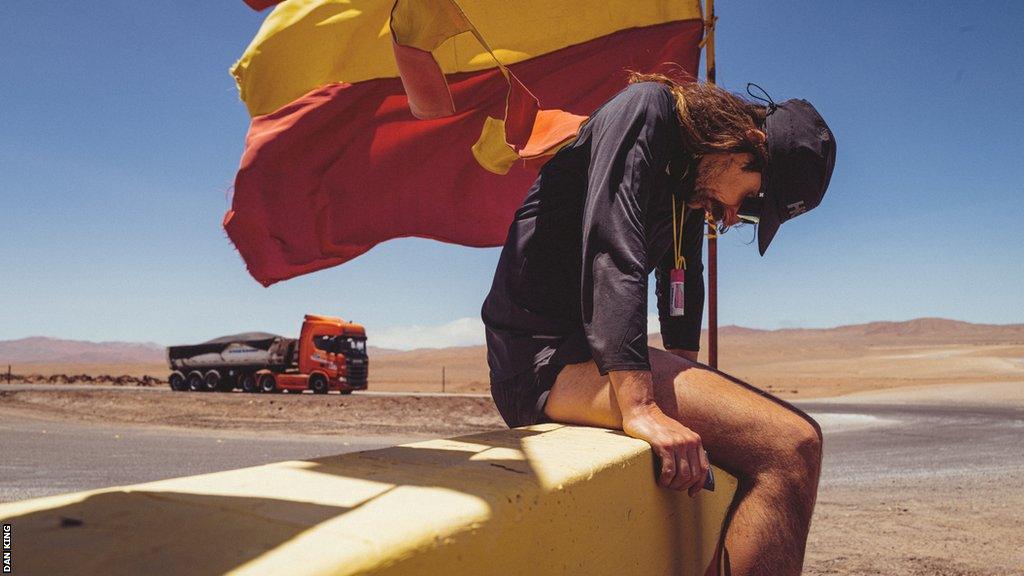
The winning team covered the 310 miles between Iquique and San Pedro just inside 35 hours
The TSP Atacama course, or what passes for it without an official route, includes only one option to resupply.
As a result, the assembled teams all have two vehicles in tow.
Mostly US-style flat-bed trucks, they are laden down with enough food, fuel and, crucially, water to sustain six runners and their support staff for one, long continuous run across a moon-like landscape.
One runner in each team of six has to be moving at all times alongside the one road that traverses this hugely inhospitable environment.
Number one runner and captain for one team, and a standout name in the race, is Roberto Mandje.
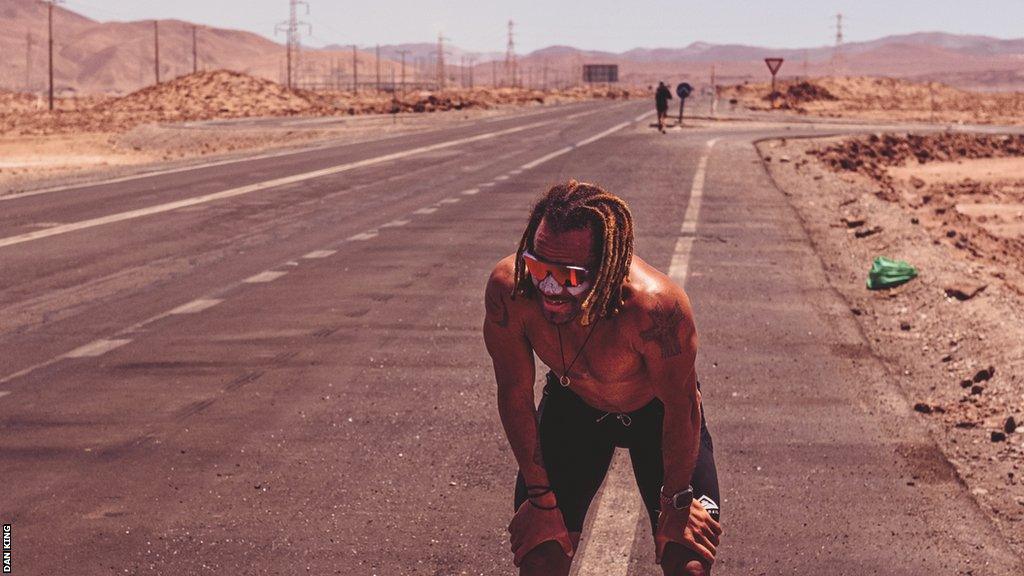
Mandje is a former Olympic athlete turned running coach
Mandje is an Olympic track and field athlete, competing for Equatorial Guinea at Athens 2004.
Later in his professional career, Mandje raced at the World Cross Country Championships and the World Trail Racing Championships.
But the track was his first love, and specifically the 1500m.
Which is handy, because his team's policy, and that of most of the other 14 teams, was little and often.
In essence, the favoured tactic for the fastest way to clock 500km was frequently swapping runners in and out and breaking the distance down into two or three kilometre sections each.
On repeat.
For nearly two days.
In theory, each leg sounded pretty achievable. About half a Parkrun at a time.
But, as Mandje attests, in the middle of the night, without any sleep and with a day's running already in your legs, The Speed Project got serious.
Mandje made his living racing the 1500m at top speed, recovering with ice baths and complex warm-down routines.
In Chile, with recovery taking place while cooped up eating cold pizza in the back of a pick-up truck, he found himself suddenly reduced to walking parts of the TSP route.
"What made it really, really challenging is you're running short intervals and then getting into a van, getting stiff, getting tired, then in another hour you're jumping back out to run again," says Mandje.
"After two days that starts to wear and tear on you - especially for those overnight legs when you're out there with your thoughts and accumulated fatigue.
"The hardest point, somewhere on day two, I just hit a 30km stretch where I struggled. Each time I got out of the vehicle I had to start each leg as like a shuffle or a speed walk.
"It was also the point of the journey where you're a long way from the start, so you can sniff the finish but you also know there's a long way, and a lot of climbing, to go.
"But hitting a rough patch was part of the beauty of it."
Long before Mandje's personal crisis, the race itself was thrown into a wider crisis.
Much more serious than pain in the legs, this was related to the strong arm of the law.
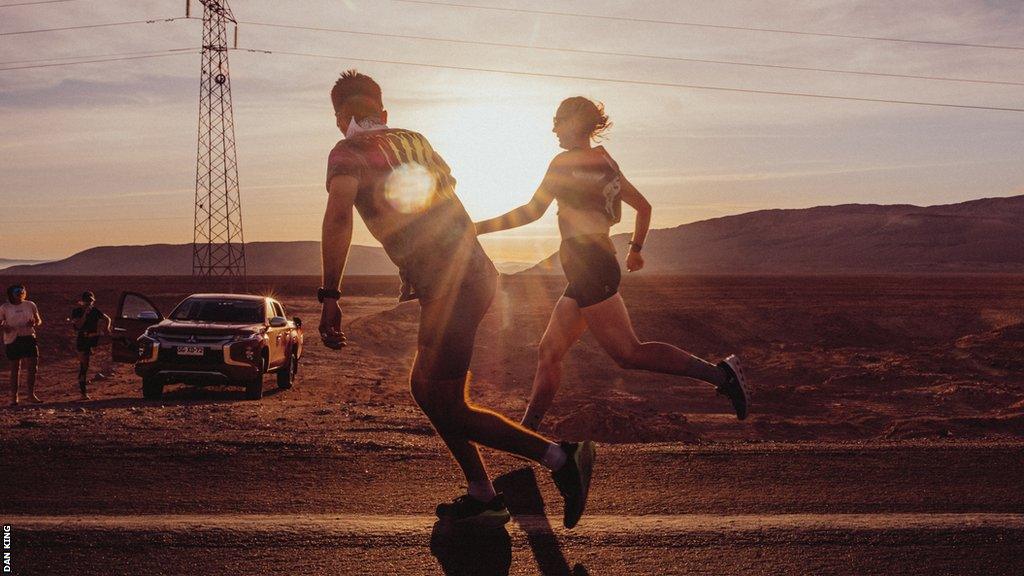
One of the race's few rules was that one runner from each team has to be on the road and moving at any one time
In the 24 hours before The Speed Project got going there were two non-negotiables.
Firstly, a trip to the supermarket to buy, among other things, nearly 100 litres of water, 60 baguettes and a mountain of nachos.
Second was to attend an off-the-record pre-race briefing in which Arend - shortly after insisting that all cameras and recording equipment were turned off - was at pains to point out a few Speed Project ground rules.
"We do our best to communicate the level of risks everybody takes by participating, and we do our best to prepare," Arend says later. "And that's also why, or partially why, we choose the people to participate and not make it a raffle to determine the field.
"It's pretty clear that this is a dangerous event.
"Knock on wood, we haven't had anything bad happen, but we know that there is the risk that it can, and we do our best to communicate that. There are certain ways how you can behave to limit that risk."
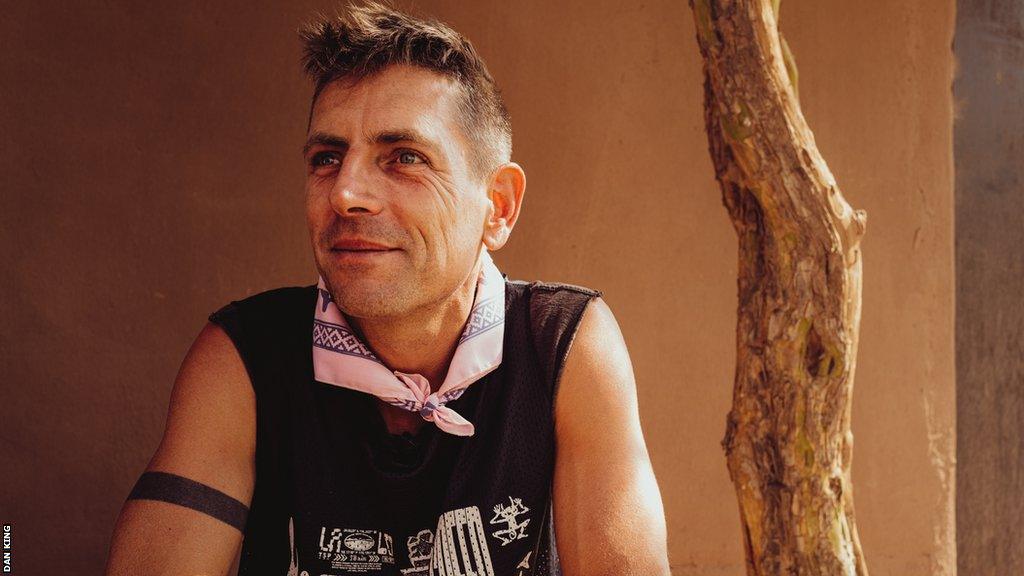
Arend, who organises The Speed Project, has a background in putting on music events as well as races
Overwhelmingly, he tried to get across the imperative that all teams put safety first.
And, secondly, in slight contradiction, he then laid out arguably the race's most vital tenets.
Unsanctioned: no route, no route markers, not an "official event" in any way, shape or form.
The party line, if pulled over by the police is that we're "just a group of friends running from Iquique to San Pedro de Atacama". Nothing to see here.
The second non-negotiable and perhaps the thing he believes in above all else?
That embracing discomfort is the path to personal growth. That authority, and the established ways of doing things, in running, and in life - are there to be challenged.
And, most importantly of all, The Speed Project is not illegal.
In the dying light of day one of the race, though, the local police begged to differ.
For much of the first few hours the gaps between the teams weren't huge.
But after a long, steep climb away from the ocean on a jet black road covered in bright white salt from nearby lithium mines, things started to split up.
At sunset, with the teams well spread, rumours were spreading like wildfire.
The race WhatsApp group was ablaze with talk of runners being threatened with handcuffs by the increasingly irate local police.
With the race taking place on the only main road in the region, runners were rubbing hard shoulders with huge mining trucks.
In the day drivers were seemingly not bothered, but the night was a different story. Their, and the police's, patience, with Arend's party line about a "few mates running to San Pedro" was starting to wear thin.
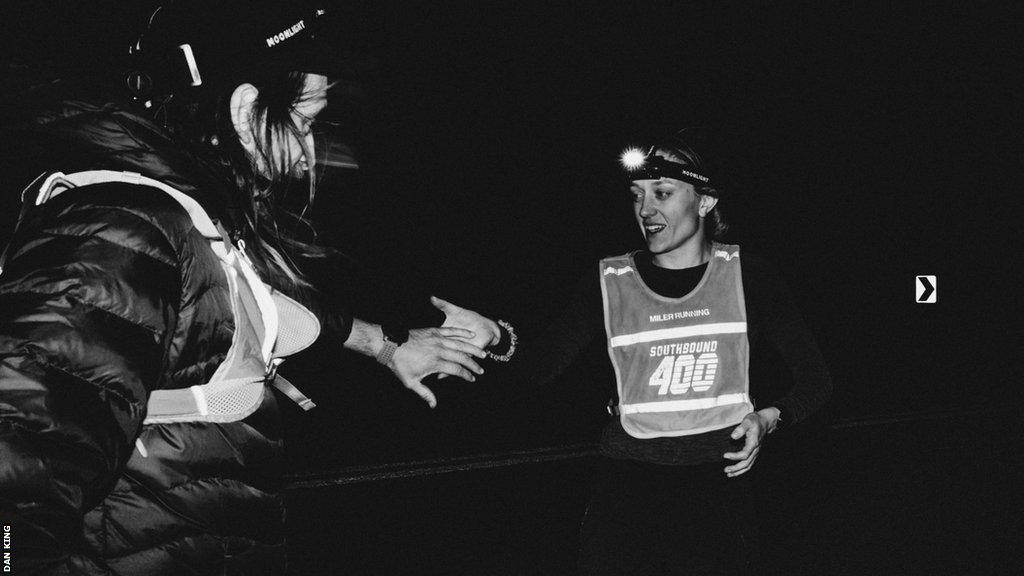
The race attracted the attention of local police, with a few teams deciding the risks involved didn't warrant continuing
So were the runners' nerves.
A meeting was hastily called just before midnight. In a truck stop of all places.
Arend calmly set out the lie of the land and, while sensitive to the fears and putting the decision into the hands of the teams themselves, also reiterated the TSP's unsanctioned, unsupported, not illegal ethos.
A couple of teams chose to stop. The majority, including Mandje's contingent, chose to race on.
For Arend it was a defining moment.
Before he found marathon running in Los Angeles in his mid-20s, Arend had organised a rave night in a borrowed brothel in Hamburg's red-light district.
Brushes with the law do not faze him, although he admits the Chilean police's near-terminal intervention have effectively ensured that this first edition of TSP Atacama will also be the last - on the 2023 'route' anyway.
"I don't think there will be another like this because of the situation with the cops," he says. "They let us get away with this one. I don't think they would let us get away with another one like that. So you need to adjust.
"We were forced to react to circumstances, forced to be creative and make some hard decisions in the moment. I love being in that spot.
"The authority issue we ran into didn't make me worry whatsoever. It was a good thing that this happened.
"There was a little bit of reality check for some people.
"Often what gets forgotten with TSP is this is truly unsanctioned - this is not just a cool word. There are some consequences to that and I tried my best to communicate those consequences."
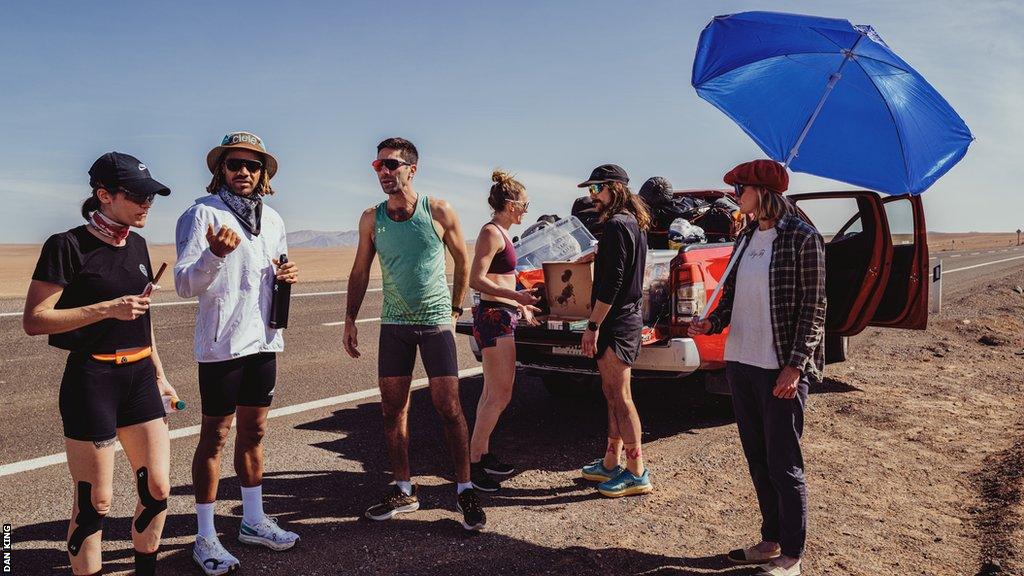
Teams found themselves having to decide, not just how to finish the race, but also whether they should
For Mandje, the consequences were life-changing.
His team finished ninth in 43 hours 46 minutes, nearly nine hours behind the winners, the Belgrade Urban Running Team, who came home in 34 hours 55 minutes.
Of the 15 teams who started, 12 crossed the finish line, a 30ft white cross on the outskirts of the Atacaman tourist town of San Pedro.
For a man who made his living in races lasting four minutes, to finish nearly six hours off the pace is quite the contrast.
But that was the point for Mandje.
The clock became, to a point, pointless.
"The Speed Project was completely different to the Olympics when you have heats, semi-finals and finals and you're putting all your eggs in one basket in terms of racing by yourself," he says.
"One of the biggest draws was that I was going into a relative unknown entity with the distance and then throw in the complexity of running with a team that you've never really run with before.
"You're demanding a lot from your body, just getting up and running whether it's in the day in the heat or the night in the cold.
"There's a lot of opportunities to get mentally drained as well as the physical impact of getting in a car and getting stiff.
"That and the daunting fact and thought of 'Oh God, we still have 160k to go'.
"All that said, I would rush to do it again. It was such a beautiful experience to connect with running that has given me so much throughout my entire life, in a new and different way."
Mandje's story from racing at the Greatest Show on Earth to an unsanctioned Atacaman ultra also embodies the juxtapositions Arend is anxious to explore.
In one sense, TSP is an elite club of 90 hand-picked runners from all over in the world taking on a race used, in part, by big outdoor and running brands as a marketing exercise.
But, at the same time, the unsanctioned, unsupported nature of the race also attracts runners craving a more universal experience, not just a race.
It is a life-changing and, at times, life-risking (when the huge trucks were charging past at over 80mph) challenge among friends.
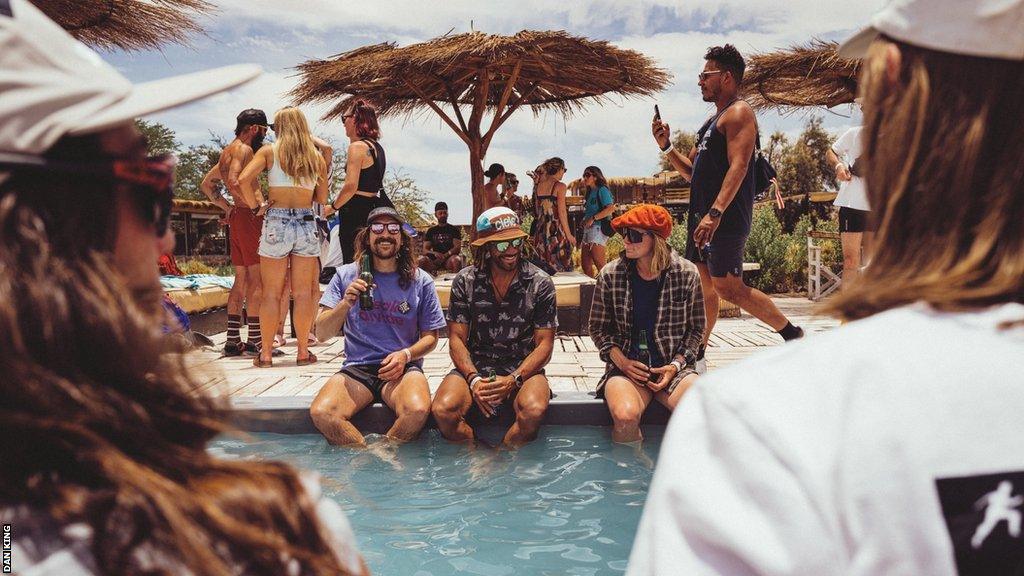
Runners celebrated completing the race at a pool party
With the challenge finished and the race over, finishers celebrated - perhaps predictably given Arend's background in the Hamburg rave scene - with a wild pool party that went long into the night.
With the planet's tallest live volcano as a backdrop, runners doubled up as DJs and finishers were invited on to the stage to play paper, scissors, rock for a commemorative tattoo there and then.
In a quiet moment away from the madness, Arend chatted about his relief that everyone made it back safely, but also his take on the camaraderie, and the allure, of The Speed Project in an increasingly sanitised world of professional sport.
"There are two ways a story can go down," he says before introducing a curious analogy.
"You're on a train in the middle of the winter, you're travelling from A to B, and everything is going according to plan.
"You stay in your space, you don't interact with anybody, you do your thing, and you just get from A to B.
"But, if on the same journey, the train gets stuck and the heater breaks, and you're in the middle of the winter, you will immediately connect with a lot of people around you, and it will, 100%, be a completely different experience.
"Ultimately, what we are doing with TSP Atacama is breaking the heater."
Or turning it up, I suggest. "Ha, yeah, or turning it up."